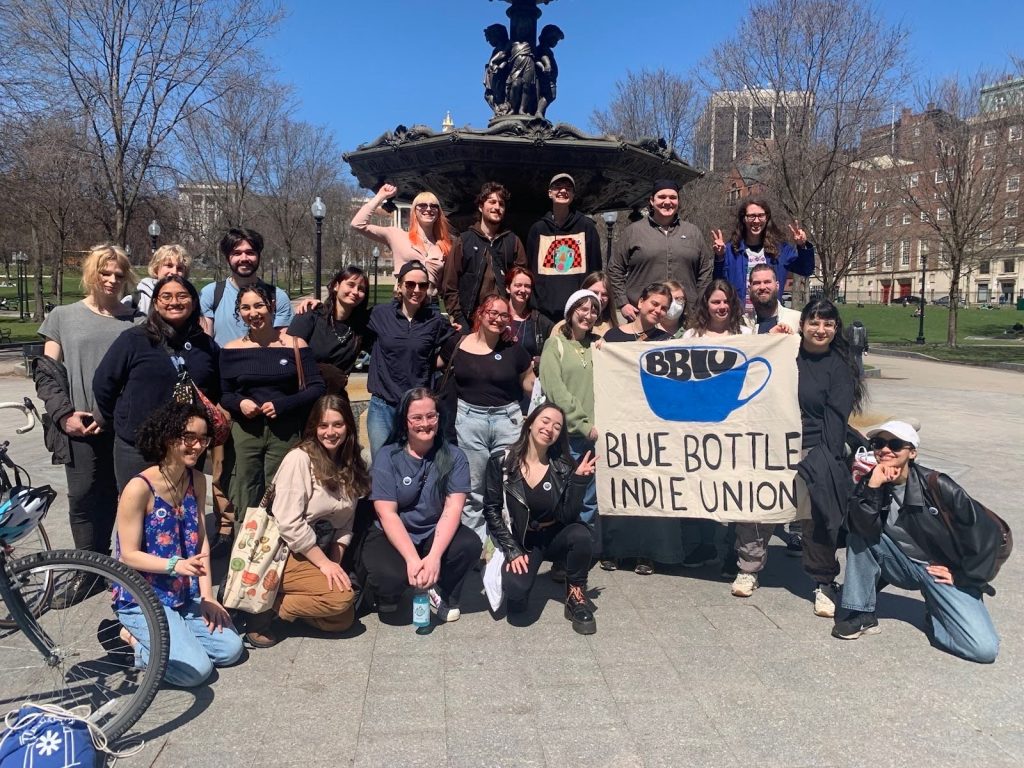[[{“value”:”Blue Bottle Independent Workers pose after going public with their campaign.
By Vanessa Bartlett
Last week, Blue Bottle Independent Union (BBIU) launched their union campaign publicly with demonstrations at the chain’s cafes in Chestnut Hill, Kendall Square, Harvard Square, Newbury Street, and the Prudential Center.
Then on Monday, cafe workers from five of the six Blue Bottle locations in the Boston area walked out and filed for an NLRB union election after management refused to voluntarily recognize their union.
In a press release, BBIU stated, “While Blue Bottle prides itself on providing high quality specialty coffee and paying fair trade premiums, baristas are not paid enough to live in the city they work in. BBIU intends to hold both Blue Bottle and Nestle to their proclaimed values of social consciousness by fighting for and demanding a living wage.”
On their Instagram, BBIU stated that they are unionizing for “a livable wage, democratic control of [their] workplace, better treatment from management and protection from harassment.”
Organizers managed to keep this eighteen-month-long campaign under wraps, while building relationships with coworkers across five of the six Blue Bottle locations in Boston. The sixth Seaport location did not join BBIU.
“We always had the goal of going public with as many stores as possible,” said BBIU worker-organizer Rocky Prull. “We wanted to do a region-wide bargaining unit, and get a region-wide contract.”
Why did BBIU choose to unionize independently?
Prull explained that initially BBIU’s organizing campaign was not independent — organizers met with two food industry unions, the first of which “ghosted” them.
Blue Bottle workers ultimately decided not to move forward organizing with the second food service union because, according to Prull, “We felt like we would not have had the control and autonomy we would have wanted in our union, the ability to make financial and actionable decisions without needing permission from someone who does not work at our stores.”
“No decisions about us, without us, kind of deal,” said Alex Pyne, another rank-and-file Blue Bottle worker. “It’s a very scary prospect to take this risk by unionizing, and it’s much easier to do that when you have a close relationship with everyone that you work with, as opposed to more traditional models, a staffer coming in and telling you what to do.”
“Something that has been at the core of our organizing has been rank-and-file democracy… that’s the thing about the independent model. We are both the workers who are unionized and the people who are unionizing,” said Prull.
What’s Next for BBIU?
Organizers are excited to get a union election date and make things official. Despite not receiving voluntary recognition of their union from management, organizers remain “optimistic” that Blue Bottle will negotiate.
“We have an overwhelming majority. Five out of six stores are ready to go whenever,” said BBIU worker Abbey Sadow. “I think we’re going to be a union, one way or another. It’s a question of when, not if.”
According to Sadow, Blue Bottle and parent company Nestlé have taken notice of the union following the Monday walkout and subsequent march to the Boston NLRB office.
“Recently, a lot of the higher ups in Blue Bottle and Nestlé have been popping into the cafes, re-explaining their open door policies,” Sadow said, referring to management offering to handle individual complaints and concerns from workers. “We’ve spent so long organizing without them knowing. Now that they are aware of it, everything feels more real.”
Organizers believe that Nestlé, a company which has previously reached collective bargaining agreements with food processing workers affiliated with the global union federation IUF (International Union of Food, Agricultural, Hotel, Restaurant, Catering, Tobacco and Allied Workers’ Associations), will be open to working with their union. According to Nestlé, 52.7% of their employees are covered by collective bargaining agreements.
For other service-industry unions, the fight for recognition and good-faith negotiation has been an uphill battle. For example Starbucks Workers United, an SEIU affiliate, started its campaign in 2021, and to date includes over 400 stores. After a three-year public pressure campaign, Starbucks affirmed they will start negotiating with the union in late February of 2024. .
BBIU is accepting donations to their union support fund, to cover costs such as printing, website maintenance and other union expenses.
Vanessa Bartlett is a staff organizer for UAW, an editor of Working Mass, and a member of Boston DSA. She has a background in print and radio journalism, but please don’t hold that against her.
“}]]

